Netflix’s funny-but-touching teen comedy show Sex Education is causing quite a stir in the UK and beyond, and the team at HO is about to go into binge-watch mode.
Gillian Anderson features as a middle aged sex therapist mum who’s way more sexually active than her teen son, while a brilliant cast of school-age characters faces up frankly to issues ranging from ‘fear of bumholes’ to the stress of being judged on the size of your penis.
It does make us compare our own school experiences of sex ed, though, which we could sum up as ‘condom on banana, don’t get pregnant’. So what are the essential things the HO team wish we’d been taught about sex at school, that we had to learn in later life instead? [Contains minor spoilers for first three episodes]
1. Masturbation is normal and good for you
We could contain the whole origin story of Hot Octopuss within this one bullet point. Because while our CEO Adam enjoyed experimenting with creating weird and wonderful sex toys from a young age, he was certainly not encouraged in this by the adults around him. An embarrassing encounter with a headmaster at boarding school during one session could have been enough to shame an ordinary boy into never masturbating again. Luckily, Adam was not an ordinary boy. Fast forward a couple of decades and Adam was not only inventing the world’s first Guybrator, but he was also setting the mission of smashing the stigma around male masturbation. Up yours, sex negative headmasters everywhere!
Seriously, though, it’s scientifically proven that masturbation is good for your physical and mental health, reducing stress and boosting your immune system. And getting to know your own body can also improve your partnered sex life, increasing confidence and communication. Rather than being left in silence or shame around this common activity, we would all have benefited from being reassured it was just a normal form of self-exploration.
We’re all grateful though that none of us ever had our mothers say to us (as Gillian Anderson’s character does to her son in the first episode of Sex Education) ‘I’ve noticed you’re pretending to masturbate and wondered if you wanted to talk about it.’ :-O
2. Gay people exist and have sex
Sex Education is definitely getting this right so far, with two openly gay main characters and a reference to a lesbian couple’s sex life in the first episode. As Anwar, one of the most popular kids in the school (who also happens to be gay), says in episode one, ‘You know homophobia is so 2008, right? Totes passé.’ And we all wish we’d gone to schools where it was possible to be open about LGBTQ-ness.
However, in researching this post we were horrified to learn that there is still no official provision for education on LGBTQ issues in UK schools, since Section 28 (a 1988 law that banned schools from ‘promoting homosexuality’) was only abolished in 2003 and current school sex ed laws date back to 2000. Pretending LGBTQ people don’t exist is not a good start to a healthy sex life and only allows prejudice to take hold.
3. Having loads of sex isn’t just for young people
Gillian Anderson! She’s 50, her character is described as a ‘some kind of sexy witch’ by her son’s schoolmate, and she spends much of her time having mindful casual sex with younger men in her house full of Kama Sutra images and phallus sculptures. And while she certainly needs to work on her boundaries around her poor son, her sex life, while presented as a little unusual, certainly isn’t stigmatised. If we’d learned about sex at school with the message we had decades of pleasure ahead of us it might have made the whole ‘losing your virginity’ thing a little less… rushed.
4. We need to rethink what ‘sex’ actually is
As teenagers, we were all pretty obsessed with penis-in-vagina sex (PIV), thinking that was the only ‘real’ sex. And sex ed only discussed PIV, as though other forms of sexual contact and pleasure either didn’t exist or didn’t matter.
Sex Education neatly presents this issue in a scene in which one half of a religious couple expresses her horror that her partner has had sex before marriage, while she has remained pure. It turns out that by this she means she’s done ‘hand jobs, fingering, oral, 69-ing, a bit of anal stuff… but no sex’. We hope the series explores this further.
As adults we know that PIV is just one kind of sex, no more or less valid than any other. Learning about all the other kinds of sex as teenagers would have taken the pressure off us considerably. As well as making us realise how wide the possibilities for pleasure are.
5. Talking about sex is very important… but, er, there are limits
Honest and supportive conversations about sex are vital to reducing stigma and increasing safety and pleasure for everybody. Sex Education is all about that. But. Telling your entire yoni massage class that your teenage son had his first wet dream? NOT SO GREAT.And finally… one thing we have noticed in Sex Education is a lack of disabled characters so far. Sex ED at school rarely includes disability, and this omission causes distress to disabled pupils as well as increasing the burden of stigma and exclusion they will face throughout their lives. Maybe one for Sex Education to think about for the next season?

